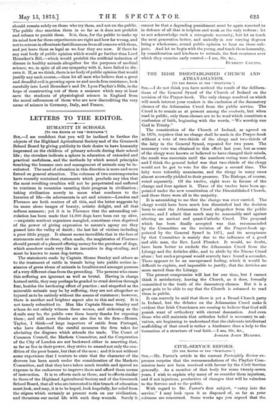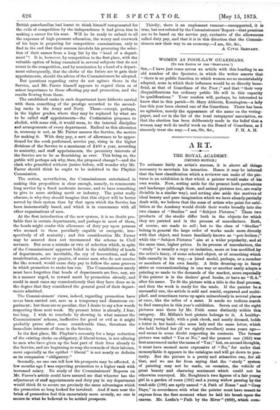CIVIL-SERVICE REFORM.
[To THE EDITOR OF THE " smscrevnt...] SIR,—Mr. Farrer's article in the current Fortnightly Review ex- presses surprise that the recommendations of the Playfair Com- mission have not been received with favour by the Civil Service generally. As a member of that body for some twenty-seven years, I wish to explain why many of us consider them injurious, and if not injurious, productive of changes that will be valueless to the Service and to the public.
With regard to Mr. Fames first subject, "entry into the service," I may look upon it as disposed of, so far as your columns are concerned. Some weeks ago you argued that the British paterfamilias had learnt to think himself compensated for the evils of competition by the independence it had given him in seeking a career for his sons. Will he be ready to submit to all the expenses of high-pressure education, the worry and overwork of his boys in preparing for competitive examinations, only to find in the end that their success involves his procuring the selec- tion of their names from a long list by the "head of a depart- ment"? It is, however, by competition in the first place, with the valuable option of being examined in several subjects that do not count in the competition, and by nomination by a head of a depart- ment subsequently, that the clerks of the future are to gain their appointments, should the advice of the Commissioners be adopted.
But questions regarding entry do not agitate those in the Service, and Mr. Ferrer himself appears to regard them as of minor importance to those affecting pay and promotion, and the results flowing from these.
The established ranks in each department have hitherto carried with them something of the prestige accorded to the ascend- ing ranks in the Army and Navy. These—except, perhaps, in the higher grades, where they may be replaced by what are to be called staff appointments—the Coramission proposes to abolish, with some risk, it would seem, to the internal discipline and arrangements of every department. Radical as this alteration is, economy is not, as Mr. Farrer assures the Service, the motive for making it. With duty pay, a sort of allowance to be appor- tioned for the work performed, service pay, rising in the higher divisions of the Service to a maximum of 1400 a year, according to seniority, and staff appointments, the pecuniary interests of the Service are to be as flourishing as ever. This being so, the public will perhaps ask why, then, the proposed change?—and the clerk who grumbled without justice before, will wonder why Mr. Ferrer should think he ought to be indebted to the Playfair Commission.
The notion, nevertheless, the Commissioners entertained in making this proposition is clear enough, namely, to remunerate long service by a fixed moderate income, and to have something to give to more striking merit or industry. The point really obscure, is why they should imagine that this object will be better served by their system than by that upon which the Service has been immemorially based, and which is in consonance with all other organisations of men.
At the first introduction of the new system, it is no doubt pro- bable that in certain departments, and perhaps in most of them, the heads might confer this allowance of duty pay upon persons who seemed to them peculiarly capable or energetic, irre- spectively of all seniority ; and this consideration Mr. Farrer may be assured does not recommend the scheme to Civil servants. But soon a mistake or two of selection which, in spite of the Commissioners' apparent belief in the infallibility of heads of departments, are inevitable, the cry of favouritism, and the recalcitration, active or passive, of senior men who do not receive the like reward, would cause duty pay to follow the same grooves in which promotion to ranks has run. The Commissioners surely must have forgotten that heads of departments are free, nay, are in a manner urged, to reward merit by promotion already, and could in most cases say conscientiously that they have done so in the degree that they considered the general good of their depart- ments admitted.
The Commissioners' views, indeed, regarding promotion have never been carried out, save as a temporary and disastrous ex- periment; but these are so peculiar, that I desire to say a few words respecting them next week. My present letter is already, I fear, too long. I wish to conclude by showing in what manner the Commissioners' scheme, ineffective for good or evil as it might probably prove after some considerable time, threatens the immediate interests of those in the Service.
In the first place, Mr. Playfair's necessity for a large reduction of the existing clerks on obligatory, if liberal terms, is not alluring to men who have given up the best part of their lives already to the Service, and are beginning to reap the rewards of their labours, more especially as the epithet " liberal " is not nearly so definite as its companion "obligatory."
Secondly, no one can tell how his prospects may be affected. A few months ago I was expecting promotion to a higher rank with increased salary. No study of the Commissioners' Reports on Mr. Farrer's article could have assured me that whoever has the adjustment of staff appointments and duty pay in my department would think fit to secure me precisely the same advantages which the promotion so long looked for involved. And if men near the brink of promotion feel this uncertainty more acutely, no one is secure.in what he believed to be settled prospects. Thirdly, there is an unpleasant rumour—unsupported, it is true, but not refuted by the Commissioners' Report—that pensions are to be based on the service pay, exclusive of the allowances called duty pay, and that it is in this direction that the Commis- sioners saw their way to an economy..—I am, Sir, &c., A Civiz, SzuvAprr.



































 Previous page
Previous page